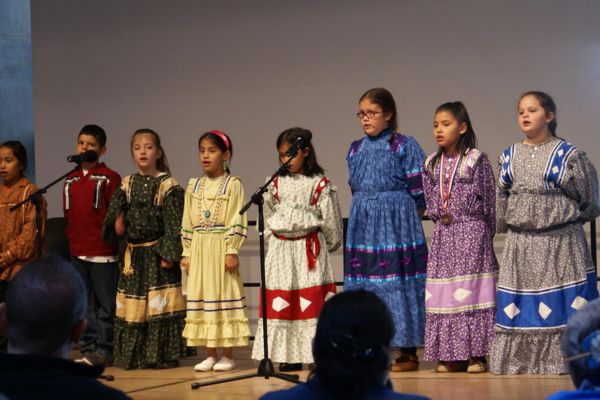
- Details
- By Native News Online Staff
Since its inception in 2003, the Native American Youth Language Fair has brought pre-K through 12th-grade Native students from around the United States to the Sam Noble Museum in Norman, Oklahoma, to learn the native languages of the nearly 40 different Native American tribes in the state.
Loss of language reaches all corners of Indian Country and is one of the reverberating effects of the Board School Era. The era, spanning the late mid-1800s to the 1960s, is marked by a government-sanctioned campaign of forced assimilation during which Native children were ripped from their families and placed in boarding schools. While at the boarding schools, Native children were stripped of their culture and forbidden to speak their Native languages.
According to the National Museum for the American Indian, there were historically approximately 500 distinct Native languages spoken in North America. In 2019, High Country News reported that of the 115 Native languages today, 99% are in danger of extinction.
Raine Heaton, Assistant Curator of Native American Language at the Sam Noble Museum and director of the fair, told OKCFox that the grant will help fund and expand this year's fair.
"The Language fair is the biggest and best-attended event that the museum hosts annually," Heaton said. "Usually, we have something like 30/40 different languages being spoken in the same place on the same day, and I think this is the only place maybe in the nation that we can say that that happens for native languages."
This year's Native American Youth Language Fair will be held April 1st and 2nd at the Sam Noble Museum on the campus of the University of Oklahoma. Speakers include Dr. Mary S. Linn, the Curator of cultural and linguistic revitalization at the Smithsonian Center for Folklife and Cultural Heritage; Geneva Navarro (Comanche), a long-time teacher of the Comanche language; and Quinton Roman Nose (Cheyenne Arapahoe), Executive Director of Tribal Education Departments National Assembly.
Dr. Linn is the founding Curator of the Native American Languages Collection It is free and open to the public. Click here for more information.
More Stories Like This
Native Students Can Win $5,000 Scholarship, International Distribution in Pendleton Design ContestAmerican Indian College Fund Raises Alarm Over Plan to Shift Native Programs Away From the Dept. of Education
MacKenzie Scott Foundation Gives $5 Million Contribution to Little Priest Tribal College
Tribal Leaders Push Back on Dismantling of U.S. Department of Education
American Indian College Fund Names 12 Student Ambassadors for 2025–26
Help us defend tribal sovereignty.
At Native News Online, our mission is rooted in telling the stories that strengthen sovereignty and uplift Indigenous voices — not just at year’s end, but every single day.
Because of your generosity last year, we were able to keep our reporters on the ground in tribal communities, at national gatherings and in the halls of Congress — covering the issues that matter most to Indian Country: sovereignty, culture, education, health and economic opportunity.
That support sustained us through a tough year in 2025. Now, as we look to the year ahead, we need your help right now to ensure warrior journalism remains strong — reporting that defends tribal sovereignty, amplifies Native truth, and holds power accountable.
 The stakes couldn't be higher. Your support keeps Native voices heard, Native stories told and Native sovereignty defended.
The stakes couldn't be higher. Your support keeps Native voices heard, Native stories told and Native sovereignty defended.
Stand with Warrior Journalism today.
Levi Rickert (Potawatomi), Editor & Publisher


